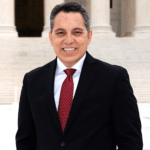October 10, 2023
All In: Latinx/a/o Families & the Battle for Educational Opportunity
Director, Education Opportunities Project at the Lawyers’ Committee for Civil Rights Under Law

From time immemorial, our nation has struggled to fully overcome its horrid historical treatment of people of color – a history that is rife with violence, subjugation, inequitable opportunity, and denial of the ability to fully participate in our multiracial democracy. Despite the past and ongoing struggles, the fight for equitable opportunities and treatment continues and Latinx communities have often been at the forefront. This is especially pronounced in education, where Latino families have challenged the segregation of students and more recently have helped defend affirmative action in higher education and diversity admissions in K-12.
Mendez v. Westminster School District is one of the more well-known, earlier education cases involving Latino families challenging school segregation. Gonzalo Mendez and four other parents filed a class action challenging the segregation of children based on their “Mexican or Latin ancestry” in four school California school districts. The districts, in part, claimed that the segregation was necessary because the students did not know English. The evidence showed otherwise. In a precursor decision to Brown v. Board’s reversal of Plessy v. Ferguson, the federal district court held that the segregation caused feelings of inferiority upon the students and enjoined the segregation.
But well before Mendez, Latino families were fighting segregated schooling. Among other places, families in Alamosa, Colorado, Lemon Grove, California, and Del Rio, Texas, filed lawsuits challenging assignment of their children to “Mexican schools.” Similar to the defendants in Mendez, many of the schools attempted to use the children’s English proficiency as a proxy for the segregation. The Alamosa case, Maestas v. Shone, et al., was perhaps the first successful case. There, the state district court received evidence of the impact of the segregation on the children and the children testified in English to demonstrate their English proficiency. Following trial in 1914, the judge found the school board in violation of a state law prohibiting racial discrimination in schools, holding “In the opinion of the court … the only way to destroy this feeling of discontent and bitterness. . . . is to allow all children so prepared, to attend the school nearest them.”
More recently, Latinx students have been co-leading the national defense of racial diversity in both higher education and K-12. Latinx students participated as intervenors and amici in both the UNC and Harvard affirmative action cases reaching the Supreme Court. Represented by the Lawyers’ Committee for Civil Rights Law, Latinx, Black and Asian American students testified in both cases about the challenges they faced in high school, where they often had to fight to be placed in advanced courses. They also testified about the social and academic benefits of being educated in more diverse settings. Although the Supreme Court rejected Harvard’s and UNC’s affirmative action programs, the critical testimony of Latinx students and their peers on the importance of race and ethnicity in shaping their experiences may have influenced Chief Justice Roberts’ opinion in holding that students may continue to lift up, and have considered, their racial experiences in their applications.
In K-12 schools, Latino families and organizations have banded together with Black and Asian American groups to defend diversity admissions programs at specialty high schools in several communities including Fairfax, Boston, and Montgomery County, Maryland. The diversity admissions programs followed examinations by the respective school districts of prior policies that were largely based on unvalidated admissions tests and fees and were leading to the exclusion of Black, Latinx, English learner, and low-income students. To make their schools more inclusive, the districts revised their admissions policies to de-emphasize or eliminate standardized tests, and substituted other, more effective race-neutral policies without considering the race of any applicant. The opposition claims that the districts revised their admissions policies to exclude Asian American students under the Equal Protection Clause, even though Asian American students remain the highest enrolled student population in the schools compared to their overall population. Essentially, the plaintiffs in these cases argue that school districts are prohibited from making changes to existing policies if they have merely considered racial demographics as part of their analysis—even though race is not a factor in admissions decisions.
The Fairfax case, Coalition for TJ v. Fairfax County Public Schools, is pending certiorari before the Supreme Court in a petition filed by the plaintiff, while the other cases are in the federal courts of appeals. To date, none of these challenges has been successful.
These are only a handful of the many impact cases and movements where Latinx community has played a key role. From Rodriguez v. San Antonio I.S.D. to Plyer v. Doe, from Martinez v. New Mexico to Cruz-Guzman v. Minnesota, and so many others, Latinx families and advocates continue to serve as a powerful presence and ally in the pursuit of racial and ethnic justice in education.
 David Hinojosa is the Director of Education Opportunities Project at the Lawyers’ Committee for Civil Rights Under Law, where he spearheads the organization’s systemic racial justice work in guaranteeing that historically marginalized students of color receive equal and equitable educational opportunities in public schools and institutions of higher education.
David Hinojosa is the Director of Education Opportunities Project at the Lawyers’ Committee for Civil Rights Under Law, where he spearheads the organization’s systemic racial justice work in guaranteeing that historically marginalized students of color receive equal and equitable educational opportunities in public schools and institutions of higher education.




